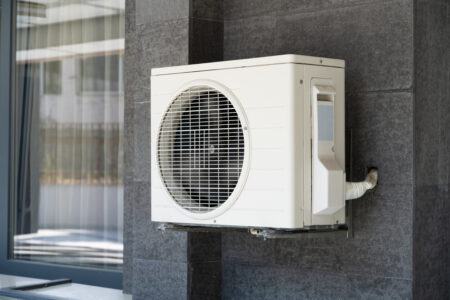Are you thinking about getting a heat pump for your home but need clarification on what’s true or false? With so many myths and misconceptions about heat pumps, it can be difficult to tell fact from fiction. We can help you make an informed decision about your home’s heating and cooling system by answering your questions about how well they work in cold climates, how much they cost to install, or how often they need to be serviced.
Myth 1: Heat Pumps Won’t Work in Cold Climates
A common misconception is that heat pumps won’t work in cold places. This myth comes from older models that didn’t work well in cold weather, but heat pumps today are made to work well in all kinds of weather. Modern heat pumps can work well even in temperatures below zero because they use advanced technology like variable-speed compressors and better refrigerants.
Heat pumps designed for cold climates have features like longer defrost cycles and helpful extra equipment. For example, many systems use heat strips to function more effectively. With these changes, the system will be able to pull heat from the outside air even when it’s very cold outside, keeping the temperature inside comfortable.
Another thing to keep in mind is that heat pumps are usually more efficient than other types of heating systems, even when it’s cold outside. Generally, the electricity they use is around a third of the amount of heat energy they can put out. Because they use energy so efficiently, heat pumps can save a lot of money over time, making them a good choice for people who live in colder areas.
Myth 2: Heat Pumps Are Too Expensive to Install
Many people believe that the initial cost of installing a heat pump is prohibitively high, but this myth overlooks the long-term savings. It’s important to think about the total cost of ownership when buying a heat pump system even if the initial cost is higher than with traditional heating and cooling systems.
Heat pumps are known for using little energy, which can save you a lot of money on your utility bills. When compared to regular systems, they can cut heating and cooling costs by up to 50%. In many places, you can also get rebates, tax credits, or other incentives for installing them. That can help cover the initial cost. Heat pumps are also cost-effective because they last a long time and are durable. A heat pump that is taken care of well can last 15 to 20 years, while older systems may need to be replaced more often.
Myth 3: Heat Pumps Only Provide Heating
Another common myth is that heat pumps can only be used to heat homes. However, heat pumps don’t create heat; they move it by pumping refrigerant. They heat up your home by taking heat from the air outside and moving it indoors. However, they can also cool by reversing that process. The heat goes from your home to your system’s outdoor unit, leaving you with cool air.
Because they can do two things, heat pumps are an easy and relatively inexpensive way to control the temperature all year. Heat pumps get rid of the need for separate cooling and heating systems by doing both. This saves space and lowers the overall cost of the system.
Myth 4: Heat Pumps Require Constant Maintenance
Some people think that heat pumps need expensive and frequent repairs, but this is not true. Regular maintenance is necessary for all HVAC systems to work at their best, but heat pumps tend to be less demanding than other types of HVAC systems.
Heat pumps need regular maintenance from you like replacing or cleaning the filters. A professional, though, can check the refrigerant levels and inspect the system parts for damage. In an ideal world, you’d have them do that twice a year — before summer and before winter. That way, you’re not potentially left without heating or cooling when temperatures become more uncomfortable. Understandably, not everyone does it twice, but doing it just once a year will still help quite a bit. (Warranties often require yearly maintenance, giving you another reason not to neglect it.)
Myth 5: Heat Pumps Are Loud and Disruptive
The perception that heat pumps are noisy and disruptive is outdated. Older heat pump models might have been noisier, but as technology has improved, noise levels have gone down. Modern heat pumps are made to be quieter by using compressors that are quieter, cabinets that are insulated, and fans that are better designed.
Most of the time, modern heat pumps are as quiet as or quieter than a regular furnace or air conditioner. Many models have technologies that reduce noise so the system runs quietly and doesn’t get in the way of your daily life too much.
The outdoor unit of a heat pump is also usually placed away from living areas, which further reduces the noise impact. If you’re worried about noise, choosing a high-efficiency, low-noise model and installing it correctly can further lower the noise level.
Myth 6: Heat Pumps Only Work Well in Newer Homes
A common myth is that heat pumps only work in newer, well-insulated homes. However, heat pumps can also be helpful in older ones. Heat pumps generally work best in newer homes that meet modern building and insulation standards. However, older homes can also benefit from these systems. You can even get higher efficiency with just a few changes.
In an older home, you can help the heat pump work better by adding insulation to the floors, walls, and attics and sealing up cracks and holes. Upgrading or fixing the system’s ductwork can also increase your heat pump’s efficiency. Professionals can assess your home’s needs and suggest ways to make sure that the heat pump works well, no matter the home’s age.
Myth 7: Heat Pumps Are Inefficient for Larger Homes
People probably believe this myth because they don’t understand how heat pumps work and how they can be expanded. Heat pumps can be a great choice for big homes as long as the system is the right size and is set up correctly. For bigger homes, a well-designed system might include several units or ductless mini-split systems to make sure that the temperature is the same all over the house.
Also, improvements in heat pump technology have made units stronger so that they can heat and cool larger rooms more efficiently. Smart controls and variable-speed compressors make the system even better at keeping the same temperature throughout any home of any size. Proper sizing and installation by a qualified HVAC professional are crucial to ensuring a heat pump system performs effectively in a large home.
Contact Us Today
To make an informed choice about your home’s heating and cooling system, you need to know what heat pumps are really like. By separating fact from fiction, you can better appreciate the benefits and limitations of this efficient technology.
Are you interested in learning more about installing a heat pump in your home? Contact Darias Heating & Air Conditioning in Victoria, BC today. We would be happy to help you explore your options, answer any questions, and guide you through the heat pump installation process. We also offer boiler, furnace, air conditioning, indoor air quality, and sheet metal fabrication services.
Services We Offer include:


